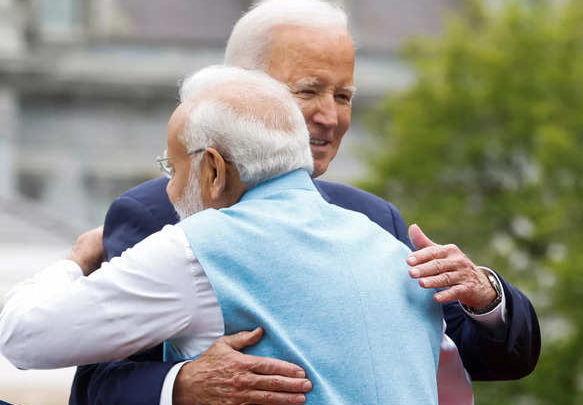Washington/New Delhi: In a major development, India and the US have agreed to end six trade disputes at the WTO through mutually agreed solutions, while New Delhi will remove retaliatory customs duties on certain American products such as almonds, walnuts, and apples.
The decision to resolve the six trade disputes outside the dispute settlement mechanism of the World Trade Organisation’s (WTO) was taken during the visit of Prime Minister Narendra Modi to the US.
According to the joint statement issued after the meeting of Modi and US President Joe Biden, “the leaders welcomed the resolution of six outstanding WTO disputes between the two countries through mutually agreed solutions”.
The six disputes include three initiated by India and as many by the US.
The six cases are countervailing measures on certain hot-rolled carbon steel flat products from India, certain measures relating to solar cells and modules, measures relating to the renewable energy sector, export-related measures, certain measures on steel and aluminium products, and additional duties on some products from the US.
According to trade experts, both countries can resolve the disputes on mutually agreed terms and later inform the Geneva-based WTO about the same.
Commenting on this, commerce and industry minister Piyush Goyal said India and the US have actively engaged in discussions for the last two years to terminate these six outstanding disputes.
These disputes have been filed by India and the US over a decade, representing certain key sectors of the economy such as steel, aluminium, renewable energy, solar products, and certain key export-related measures. This mutually agreed solution negotiated by both sides marks the culmination of protracted negotiations, and it is unprecedented in WTO history, the commerce ministry said.
He also said that as a result of the agreement, exports of certain steel and aluminium products from India to the US would get an exemption from additional duties.
“They (US) have assured us that all exclusion (from additional duties) requests that India makes or US importer makes…They have given an assurance that at least 70 per cent of all such requests for steel and 80 per cent of all such requests for aluminium for products originating from India will be excluded from the additional process of Section 252 (of a US law),” Goyal said.
These remarks assume significance as in 2018, the US imposed 25 per cent and 10 per cent import duties on certain steel and aluminium products, respectively, on grounds of national security.
The US administration had imposed these duties using Section 232 of an act that permits the president to restrict imports.
In retaliation, India in June 2019 imposed customs duties on 28 American products, including chickpeas, lentils, almonds, walnuts, apples, boric acid, and diagnostic reagents. India had also filed a complaint against the US in WTO on imposing these duties.
The United States Trade Representative (USTR) said that the two countries “have agreed to terminate six outstanding disputes” at the WTO.
On India’s decision to remove retaliatory customs duties on certain American products like chickpeas, lentils, almonds, walnuts, apples, boric acid, and diagnostic reagents, USTR Katherine Tai said that these tariff cuts will restore and expand market opportunities for US agricultural producers and manufacturers.
Trade experts stated that the move will help boost two-way commerce and strengthen economic ties.







